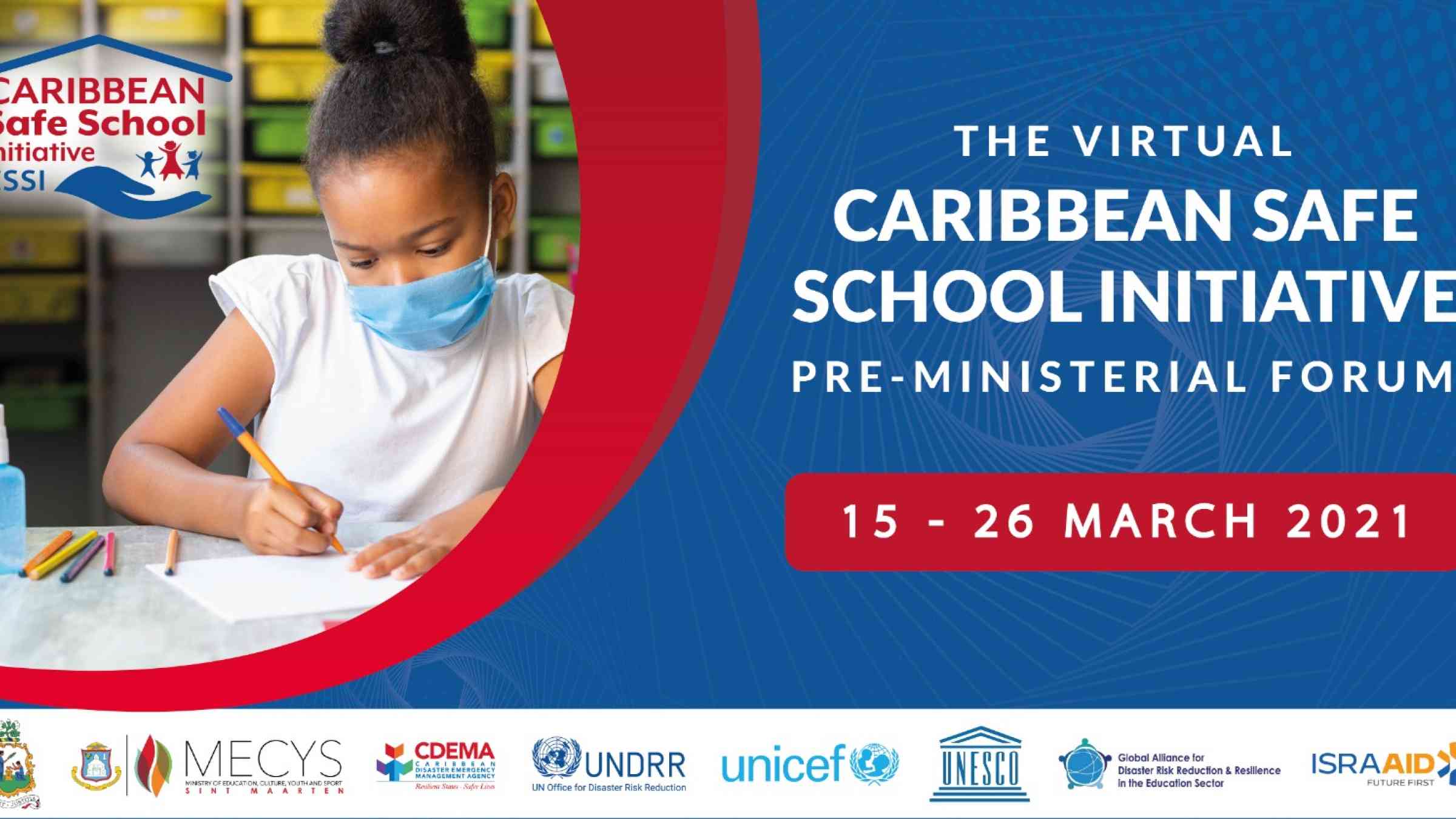UNDRR ROAMC - Regional Review on School Safety in the context of Systemic Risk: The Virtual Caribbean Safe School Initiative Pre-Ministerial Forum

- English
The COVID-19 pandemic has made evident the systemic nature of risk, and highlighted the exposure of different systems to multiple hazards, as its unprecedented cascading effects have impacted all sectors and levels of our economies and societies. The Global Assessment Report 2019 (GAR) and the Sendai Framework for Disaster Risk Reduction reflect the certainty that in an ever more populous, networked, and globalizing society, the very nature and scale of risk have changed, to such a degree that it surpasses established risk management institutions and approaches.
In the Caribbean, the COVID-19 pandemic has had a direct impact on the education systems of all countries in the region. Education systems in the region have been responding to the effects of the COVID-19 pandemic, but they are also implementing actions to mitigate the potential consequences of the hurricane season, which is more active than usual, and other latent hazards, such as geological ones (earthquakes and tsunamis) and social ones (migration). The region is experiencing the effects of systemic risk as we witness the interplay and amplification of the varied effects of multiple events. As recovery plans and other instruments are being designed by national and regional entities, they present an opportunity to: 1) reiterate the value of education in building resilient societies, and 2) the need for multi-sectoral, multi-stakeholder, and regional coordination. In this order of ideas, the Caribbean Safe School Initiative (CSSI), which aims to advance school safety in the Caribbean, is the regional mechanism to rehearse this link between education and resilience, and secure coordination.
It is in this context that development actors have organized several virtual fora with the intention of generating meaningful dialogue around this pertinent matter. CDEMA, with the support of the United Nations Office for Disaster Risk Reduction (UNDRR), Regional Office for the Americas and the Caribbean, on behalf of the Safe School Working Group organized the webinar: COVID-19, “Systemic Risk and Education Sector Resilience in the Caribbean Region” on May 28, 2020, with a number of aims, including to allow for the sharing of country experiences on how the education sector is facing the pandemic as well as lessons learned and recommendations for sector response and recovery as it relates to a global pandemic. Several key recommendations emerged from the online seminar, including those intended to influence and shape:
1. The pertinence of the Comprehensive School Safety Framework, upon which the CSSI has been structured;
2. School-related public health measures that keep students and educators safe from death, injury, and harm in schools;
3. Securing the continuity of education through all expected hazards and threats management;
4. The nature of support from regional partners to advance the CSSI;
5. School preparedness, mitigation, recovery, and response for education resilience.
The Caribbean Safe School Ministerial Forum is the flagship biennial meeting attended by Ministers of Education from the whole region, disaster risk reduction practitioner, and, international and regional stakeholders, to explore and identify policy opportunities and gaps for Education Sector Resilience, as well as their regional coordination. This, in the context of systemic risk, and with a multiple hazards approach, including biological hazards, such as COVID-19. It is the Forum for attaining and/or affirming the support of the region’s Ministries of Education of the Antigua and Barbuda Declaration on School Safety in the Caribbean, as well as to the agreed Road Map for its implementation.
The Declaration embraces the Comprehensive School Safety Framework as its internationally recognized approach to reducing risk to various hazards in the education sector. At the First and Second Forum, eighteen countries and territories have already signed the Declaration, and it is expected that in future Forums other Caribbean states will join the Initiative. The Third Ministerial Forum will be hosted by the Ministry of Education in Sint Maarten, and was originally scheduled for May 2021. To promote full participation at the Forum and considering the uncertainties affecting the various states’ ability to ensure their respective participation in the near future, it is being proposed that the forum be deferred to early 2022. Considering this shift, there remains the opportunity for a timely event that captures and synthesizes the plethora of dialogues on Education Sector Response to the COVID 19 pandemic that have already taken place through multiple partners, and the range of responses that the Ministries of Education and other partners would have implemented by the end of the 2020 Hurricane Season.
Technical Session 1: School Safety Focal Points Discussion
Technical Session 2: National Disaster Management Offices’ Directors
Technical Session 3: Inter-sectoral Partners
Technical Session 5: Practitioners (educators, teachers, principals, communities)
Technical Session 6: School Safety Investments as a key element of Economic Recovery
Explore further
Also featured on
Is this page useful?
Yes No Report an issue on this pageThank you. If you have 2 minutes, we would benefit from additional feedback (link opens in a new window).